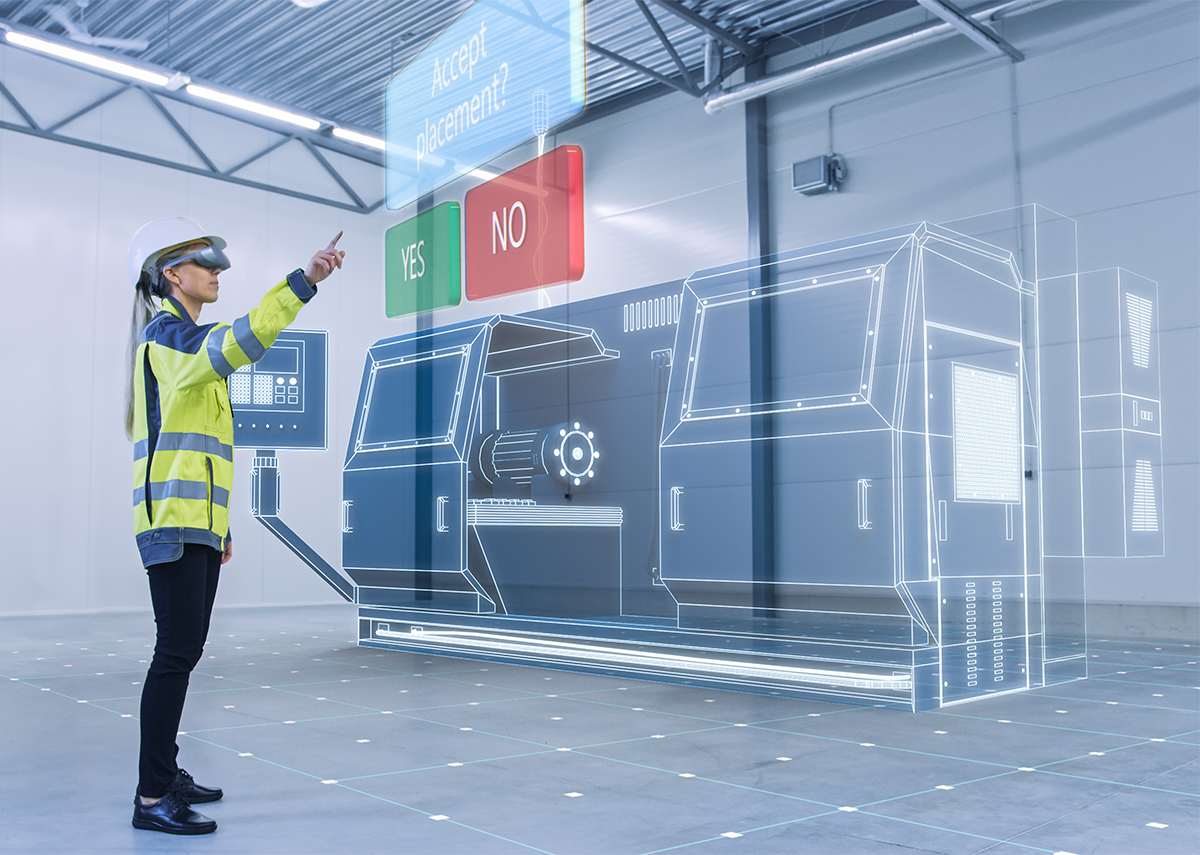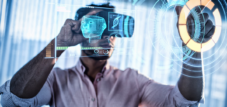Xtended: Extended Reality for business and industry
Extended Reality (XR) is an umbrella term for all immersive technologies, including Augmented Reality (AR), Virtual Reality (VR), and Mixed Reality (MR), as well as those still under development. XR technologies enhance the reality we experience by either merging the virtual and "real" worlds or creating a fully immersive experience. The global XR market is expected to be valued at $31 billion in 2021 and grow to nearly $300 billion by 2024. Regionally, XR innovations are particularly prevalent in the United States and the Asia-Pacific region, especially Japan, South Korea, and China.
Suitable for:
- The Power of Xtended/Extended Reality – Short insight
- Extended Reality potentials and areas of application
XR headsets and companies
VR creates an artificial environment, while AR simply uses the existing environment by overlaying new information onto it. In both VR and AR, the information or images are typically made available to the user via a headset. VR headset providers include Oculus, Sony, and HTC, while Microsoft, Magic Leap, and Vuzix offer AR headsets and glasses. In addition to these companies, LG and Qualcomm are among the leading holders of XR patents. Chipmaker Qualcomm has partnered with 15 telecommunications providers worldwide to form the Global XR Content Telco Alliance, aiming to develop 5G-based AR/VR content.
🏢 👨🏻 👩🏻 Digital services for your company - locally and globally
We work in the area of business development and help you strengthen and expand the market.
We look forward to seeing you!
🚀 👧🏽 👦🏽 For agencies that can use our help
We support you in strategic questions, regionally and internationally. Project-based or comprehensive.
XR applications
Experts anticipate that improvements in XR hardware, such as the introduction of smaller and more comfortable devices, along with advancements in software applications and connectivity, will support the growing adoption of XR across a range of industries. Healthcare, manufacturing, and automotive are expected to be among the sectors most impacted by XR technologies. As the technology continues to improve, XR use cases will expand and intensify, with the economic benefits of XR likely to be felt globally. The recent developments in virtual showrooms, virtual fairs, and virtual events & meetings, driven by the COVID-19 pandemic, have provided a significant boost.
Suitable for:
- Current status of Virtuality (Digital Showroom & Virtual Fairs)
- Augmented reality in the digital-physical world
- Extended Reality (XR) Library (PDF)
Percentage of executives worldwide who use augmented or virtual reality technology
According to current data, 35 percent of the surveyed executives have implemented augmented or virtual reality (AR/VR) technologies in at least one business unit, and 13 percent have used the technology in multiple units. In contrast, three percent of the surveyed executives did not know the extent to which their company uses augmented or virtual reality technologies, and another 11 percent confirmed that they have neither evaluated this technology nor plan to implement it.
Degree of AR/VR technology adoption among global CEOs
- 27% – Piloting
- 24% – Evaluate or plan a pilot
- 22% – Introduction in a business unit
- 13% – Introduced in multiple business areas
- 11% – No planning or evaluation for implementation
- 3% – Don’t know
Augmenting working time through Extended Reality (XR) technology
Percentage of working time that could be augmented by Extended Reality (XR) technology in 2019: In 2019, 35 percent of working time in the health and social care sector could be augmented through the use of Extended Reality (XR) technology. In comparison, only 16 percent of working time in the business services sector could be augmented, which is below the average of 21 percent across all sectors studied. Workers in all sectors could improve their productivity through the use of XR, with the opportunities being most noticeable in health and social care, manufacturing, and construction.
Augmentation refers to the process of a person collaborating with technology to perform a task more productively. In contrast, automation occurs when technology replaces a person in performing a task. The source model illustrates augmentable working time for various industries.
Suitable for:
What percentage of working time is augmented by Extended Reality?
- 35% – Health and social services
- 30% – Manufacturing
- 30% – construction industry
- 23% – Education
- 23% – Retail
- 22% – Mining
- 22% – Information and communication
- 21% – Transport
- 21% – Public sector
- 20% – Utilities
- 19% – Tourism
- 17% – Leisure and other services
- 17% – Financial services
- 16% – Business services
Global market spending on Extended Reality (XR) technologies
As predicted in a 2019 report, the business use of Extended Reality (XR) technologies will increase worldwide from 2018 to 2023 across all industries, with forecasts predicting that in 2023, $35 billion will be spent on these technologies in the manufacturing and construction industries alone.
A common misconception is that virtual reality (VR) and augmented reality (AR) are limited to the gaming and entertainment industries. However, this is beginning to change, as experts have noted that in 2019, industrial spending on XR technologies surpassed consumer spending. Analysts predict that by 2023, industrial adoption will be three times that of consumers, with the applications of XR technologies expanding and evolving as businesses realize their full potential.
Global market spending by industry on Extended Reality (XR) technologies
2023 – Extended Reality Spending in Billions US Dollars
- 35 – Manufacturing and Construction
- 24 – Public Sector
- 20 – Communication, Media & Entertainment
- 19 – Professional Services & Retail
- 10 – Transport, Logistics and Wholesale
- 7 – Resources
- 5 – Financial services
2022 – XR technologies spending in billions of US dollars
- 24 – Manufacturing and Construction
- 17 – Public Sector
- 14 – Communication, Media & Entertainment
- 13 – Professional Services & Retail
- 7 – Transport, Logistics and Wholesale
- 5 – Resources
- 4 – Financial services
2018 – Spending on Extended Reality in billions of US dollars
- 1 – Manufacturing & Construction
- 1 – Public Sector
- 1 – Communication, Media & Entertainment
- 1 – Professional Services & Retail
- 0 – Transport, Logistics & Wholesale
- 0 – Resources
- 0 – Financial Services
Suitable for:
Views of industry professionals on the ubiquity of augmented reality (XR) technologies compared to mobile devices
In a survey conducted in early 2019, 39 percent of respondents agreed with the statement that extended reality (XR) technologies will be as ubiquitous in the consumer market as mobile devices by 2025. This stands in stark contrast to the two percent who disagreed with this assertion.
In this survey, XR technologies encompass augmented reality (AR), virtual reality (VR), and mixed reality (MR). The question was: “Please indicate your agreement with this statement: By 2025, AR/VR/MR/XR will be as ubiquitous in the consumer market as mobile devices.” Percentages exceeding 100 percent are due to rounding.
Views on the ubiquity of Extended Reality (XR) technologies by industry professionals – Percentage of respondents
- 39% – Strongly agree
- 47% – Agree
- 9% – Neither agree nor disagree
- 5% – Disagree
- 2% – Strongly disagree
Factors responsible for the AR market outperforming the VR market
Factors that, according to XR/AR/VR/MR industry experts in the USA, are most responsible for the Augmented Reality (AR) market overtaking the Virtual Reality (VR) market in 2020
Cost, accessibility, and security are the three factors most responsible for the augmented reality market eventually overtaking the virtual reality market, according to a survey of XR industry experts.
Which of the following factors are most responsible for the AR market overtaking the VR market?
- 57% – Costs (e.g., creating good AR apps or adding AR features to an existing app is cheaper than producing good VR apps and content)
- 52% – Accessibility of AR
- 45% – Security
- 41% – Simpler and more intuitive experiences through AR
- 33% – Increased corporate investment in AR technology
- 30% – Scalability of AR
- 30% – More real-world applications and tangible benefits for AR
- 27% – Greater range of AR-compatible applications and software
- 24% – Higher preference for AR among consumers
- 9% – No need for additional devices for AR
Current PDF libraries to support your further strategic planning and activities
We provide you with further numerous insights into numbers, data and facts that can help you optimize and expand your strategic goals:
- Customer Demographics Library – Demographics Knowledge Base (PDF)
- Online Marketing Library (PDF)
- E-Commerce Library – Knowledge Base (PDF)
- Social Media Marketing Library – Knowledge Base (PDF)
- SEO Library – SEM knowledge database (PDF)
- Search Engine Advertising / SEA Library – Search Engine Advertising Knowledge Base (PDF)
- Extended Reality (XR) Library (PDF)
Why Xpert.Digital for Bremen and Berlin! – Virtual Showroom, Augmented, Mixed & Extended Reality Agency
I would be happy to serve as your personal advisor.
You can contact me by filling out the contact form below or simply call me on +49 89 89 674 804 .
I'm looking forward to our joint project.
Xpert.Digital – Konrad Wolfenstein
Xpert.Digital is a hub for industry with a focus on digitalization, mechanical engineering, logistics/intralogistics and photovoltaics.
With our 360° business development solution, we support well-known companies from new business to after sales.
Market intelligence, smarketing, marketing automation, content development, PR, mail campaigns, personalized social media and lead nurturing are part of our digital tools.
You can find out more at: www.xpert.digital – www.xpert.solar – www.xpert.plus


